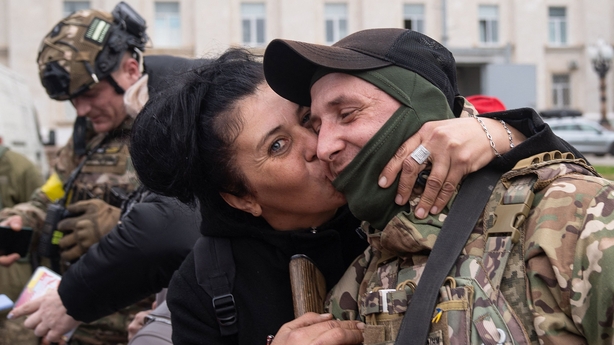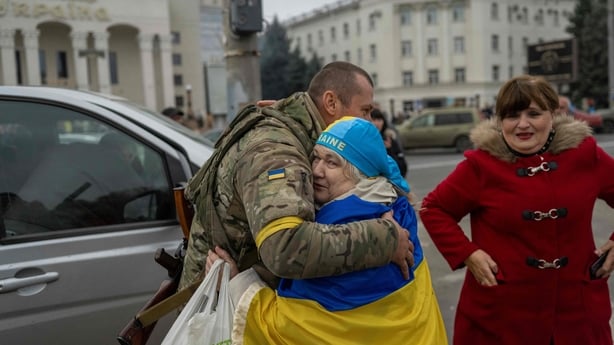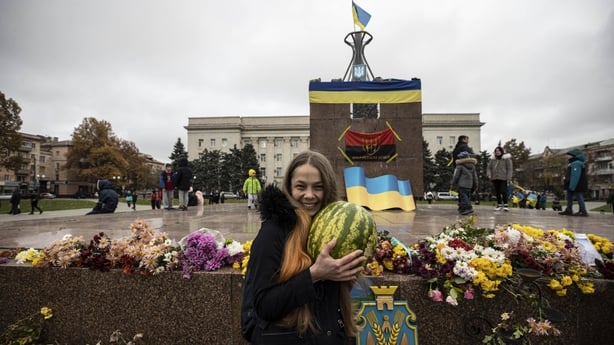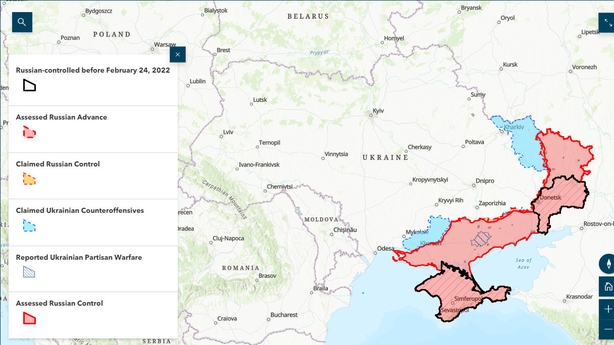The momentum is with Ukraine, but the war is far from over.
That’s the assessment by defence and security expert at University of Bath Dr Patrick Bury after the withdrawal of Russian troops from the southern Ukrainian city of Kherson last Friday.
It’s rare to see happy scenes when covering the war in Ukraine, rarer still to see such unadulterated joy.

Residents of the city of Kherson, under Russian occupation for around eight months, have had a difficult time. And it’s far from over, but the moments of triumph must be celebrated.
Images of happy Ukrainians embracing arriving soldiers started trickling in on Friday and kept coming throughout the weekend.
Babushkas handing out flowers and hugging uniformed young men, children waving Ukrainian flags, and watermelons everywhere.

Kherson is known for its watermelons, and the fruit has become emblematic of the strength of Kherson.

Ukrainian officials in Kherson say they’re racing to restore utilities to the city, but that the humanitarian situation is very serious. They say that fleeing Russian troops mined critical infrastructure, leaving residents without water, power and gas.
Yaroslav Yanushevich, head of Kherson regional state military administration expressed his happiness at the ongoing celebrations, but he urged caution, saying mine clearance was under way.
“The enemy mined almost everything. I beg you, don’t gather in crowded places. Moreover, tomorrow, November 14, de-mining work will be carried out in the city centre. Therefore, I beg you not to drive into the central part of the city. I hope for your understanding.”
“Slava Ukraina,” he added, “Glory to Ukraine!”
Yesterday evening, President Volodymyr Zelensky said evidence of 400 Russian war crimes had been uncovered in Kherson.
“Investigators have already documented more than 400 Russian war crimes. Bodies of dead civilians and servicemen have been found,” Mr Zelensky said in his nightly video address.
He said “stabilisation and the restoration of law” had been established in 226 settlements affecting more than 100,000 residents. Arrests of Russian soldiers and mercenaries were proceeding.
Kherson city has been badly damaged, and its population hurt, and while the temptation is there to see the city’s liberation as an inflection point, what does the future hold?
Dr Bury said the liberation is certainly significant, for two reasons.
“One; symbolically, you know this is the only major city and the capital of an oblast which Russia had taken and had about 380,000 people in it.
“Only six weeks ago, Vladimir Putin said it was part of Russia, was going to stay that way forever and now guess what he’s pulled out. And I think militarily it’s also significant, but it’s the right decision in terms of the Russian perspective. For months that Russian generals have been saying we can’t hold this.”
Dr Bury said Moscow was having difficulty supplying its troops, describing them as some of Russia’s best soldiers in the whole army. Dr Bury, a former army officer, says from a professional military point of view, the retreat was “the most orderly operation we’ve seen the Russians commit since the start of the war.”
So, what next for the Russian army, who retreated eastwards across the Dnipro River last Friday?

Dr Bury said they will regroup where they are and hope that the Dnipro River will provide a natural barrier, as it is about 1km at Kherson city.
“Of course, the Russians can still continue to shell Kherson if they want to, and that remains to be seen if they do, but their plan is to hold that bank. The problem for them is actually further up, near Zaporizhzhia.”
He said Russian forces “are still vulnerable to a flanking manoeuvre [by Ukrainian troops] from the north coming down. And this is something I’d expect to see materialize, certainly by late spring next year.”
There has been some speculation about whether winter will bring a lull in fighting, but Dr Bury said while winter makes things harder, “both sides know how to fight in winter, so it might slow things down a bit, but the Ukrainians are keen to keep moving.
“They know that ultimately the clock is ticking on Western support, on the potential that Putin eventually will escalate and so they want to keep taking back as much of their country as they can.
“So that’s why you would expect to see more things happening in other areas as well, but I think, as happened in the past, the major offensive will happen in late spring and summer next year.”
And of course, the Ukrainians have said that there is still bitter, bitter fighting in the east of Ukraine that’s ongoing.
Welcoming the progress in Kherson, Kyiv has warned that while this battle might be over, the war was far from won.
Dr Bury agreed.
“The momentum is with Ukraine at the moment. I think next summer you’ll see not only Ukrainian troops with better equipment coming into the fore, with better training; mobilised civilians, essentially. You’ll also see some Russians doing the same and the question is; who’s going to be more effective?
“My hunch is, the Ukrainians will launch a series of counter offensives which will cause the Russians all sorts of problems and then Vladimir Putin will escalate up the nuclear ladder but not actually use weapons.”
After Kherson’s liberation, what next for Ukraine?
Source: Viral Trends Report


0 Comments